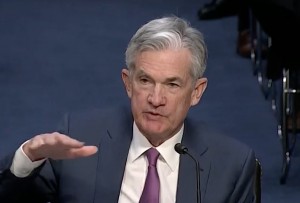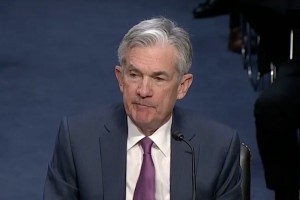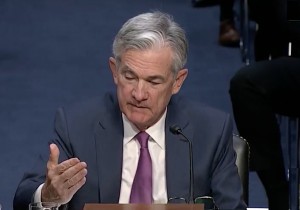
Fed Chair Jerome Powell recently warned the U.S. economy could be hurt by escalating trade tensions between the U.S. and its trading partners.
The nervous reaction that has begun to paralyze decision-making in the auto industry has also drawn the notice of the Federal Reserve Board.
Federal Reserve Chairman Jerome Powell, who was appointed by President Donald Trump, cautioned during a Senate hearing that mounting trade tensions between the United States and major economic partners could pose serious risks to the U.S. and the global economy.
Powell was cautious in his remarks and tried to avoid commenting directly on Trump’s policies, when pushed by members of the Senate Banking committee on how deeply the U.S. could be harmed in a trade war, according to The Hill.
In the most eye-opening portion of his testimony, Powell said escalating tariffs by the U.S. and others had already stunted business growth even though it was still too early to know the final impact.
(Trump tariffs could complicate PSA’s return to the U.S. market. Click Here for the story.)
The slowdown has been evident in auto sector where plans for new plants, both in the U.S. and Mexico, have been parked while diplomats wrestle with the North American Free Trade Agreement and tariffs.
Powell said in a recent interview the Fed is “hearing a rising level of concern” from U.S. firms about the impact of Trump’s tariffs, which could trigger several “very challenging” economic situations.
A new level of uncertainty was added this week when the U.S. filed cases against five trading partners, Canada, Mexico, Japan, China and the European Union, before the World Trade Organization, adding to a slew of legal actions over the administration’s tariffs. The move, however, also suggests the Trump administration is less confident that it kind find a way out of the trade conflict through direct negotiations.

Powell warned that a tariff war with other countries will negatively impact the U.S. and global economies.
Eight countries, including China, have filed cases at the WTO against the U.S. about the tariffs dispute as new U.S. tariffs have been applied to hundreds of products.
Trump, ironically, has been highly critical of the WTO and has threatened to pull the U.S. out of the organization dedicated to crafting and enforcing trade rules.
In his testimony before the Senate Banking Committee, Powell suggested the uproar over trade help “If it results in lower tariffs for everyone, that will be a good thing for the economy,” he said.
“If it results in higher tariffs across a broad range of goods and services that remain that way for a long time, that will be bad for our economy and other economies, too,” he added.
(Click Here to see how automakers could come out losers if Trump scuttles all tariffs.)
Lawmakers, business groups and agriculture exporters have expressed worries that Trump’s tariffs on steel, aluminum and Chinese goods — and the retaliation they spur — could cause widespread economic harm.
The Fed chairman, though, touted the strength of the U.S. economy in his opening remarks to the committee, citing a tight labor market, a stable financial system and rising consumer spending driven by higher after-tax income and increasing household optimism.
Congressional Republicans are concerned a trade war could tank a strong economy and wipe out the effects of last year’s $1.5 trillion tax cut before this November’s midterm elections.
The GOP is banking on record-low unemployment, strong economic growth and rising consumer optimism to maintain their grip on both the U.S. House of Representative and the U.S. Senate.
Sen. Pat Toomey (R-Pa.), a staunch tariff opponent, told the Hill the Fed’s report of dying capital expansion plans was “disturbing” and a threat to the economic boost that Republicans sought by slashing tax rates.
The Trump administration is also quietly taking other steps to slow the rise in gasoline prices, which is helping fuel inflation, slow the pace of economic growth and put more pressure on household budgets, by easing sanctions back on the threat of sanctions on companies that purchase oil from Iran.
(To see more about how Trump’s potential auto tariffs are getting a global pushback, Click Here.)
The easing in of the sanctions has helped cut the price of crude oil, which could result in lower gasoline prices in the near future.

